
GRE 101
GRE Exam 2023 - Pattern, Syllabus, Registration, Score & Preparation Tips

You might have just heard the word for the first time, and are now wondering ‘What is the GRE?’ Naturally, you might have questions such as:
- Who needs to take the GRE?
- What is tested on the GRE?
- Why does this score matter?
- What is a good GRE score?
- How much does GRE cost?
- How long should I study for GRE?
- What is the syllabus of GRE?
- Is the GRE hard?
In this GRE guide, we will be covering the answers to all of the questions above (and much more) in a detailed manner, with expert information from our team at Galvanize who’ve cracked the GRE themselves! Let’s dive in.
Chapter 1
What is GRE?
In this post, we will look at what is the GRE and why this exam is so important. We will also learn a little bit about the exam pattern, what kind of questions you can expect on the GRE, and other important GRE exam details.
GRE Full Form
The full form of GRE is the “Graduate Record Examination”. The GRE exam is designed and administered by Educational Testing Services or ETS. The GRE tests you on three different skills – verbal reasoning skills, quantitative reasoning, and analytical writing skills.
The overall test comes to around 3 hours and 45 minutes so that’s roughly four hours.
But what is the GRE test for?
Well – If you’re applying to a Masters or a Ph.D. program in the USA, GRE scores are almost mandatory.
Most of the programs require a GRE score. Additionally, universities in other countries like Germany, the UK, Canada, and France have also started accepting GRE scores.
There are many universities that have started accepting your GRE. As of last year, the exam is conducted in more than 180 countries and it takes about 200 dollars to write this test.
The test is mainly computer-based. They do offer paper-based tests as well but they’re very rare so most likely you’re going to be taking the test on a computer.
ETS releases the GRE exam dates a year in advance giving you ample time to book a date once you’ve settled on it.
You can only attempt the GRE up to a maximum of five times within a period of twelve months.
Also, note that you can attempt the GRE once in a span of 21 days. So, if you have to attempt it again you need to wait for 21 days and reapply within that time frame.
You are free to select your exam date by telephone, fax, mail, and online (which is what we recommended as you can register for GRE fastest online).
Another factor to note is the GRE score validity. These scores are valid for a period of five years but it depends on when you’ve taken the test. Unlike the TOEFL score which is valid for only two years, GRE provides you with a long time score validity.
For example, if you have taken the GRE exam on or after July 5, 2019, your scores are valid up to July 4, 2024.
Chapter 2
How to Start your GRE Prep?
How long should you prepare for the GRE before you sit for the test?!. This question is actually quite student-specific and depends on each student’s potential and will vary from person to person. But nevertheless, a general roadmap can be drawn on the amount of time that any student will need to put in for getting good scores. Here at Galvanize, we emphasize certain aspects that will ensure your preparation time is worth it!!
Current Score to Dream Score
First, we advise all students to take a practice test to see where they stand. This will not only give you a taste of the test but will also show you possible areas where you need to pay more attention. If you feel you are not up to taking the practice test on Day 1. You can choose to take it after giving yourself 1-2 weeks of prep time. Then you can compare that to the university-required scores/your target score and see how you can reach it.
Scores that certain universities ask as of 2023 (Keep in mind average GRE score requirements can change yearly and vary as per courses/majors).
University Name |
Quant |
Verbal |
| Columbia | 168+ | 158+ |
| Georgia Tech | 162+ | 155+ |
| Texas A&M | 164+ | 157+ |
Depending on the master’s course you are targeting and the shortlist of universities, you can get a very clear idea of the kind of GRE score margin that you would need to get a successful admission to the particular program you aspire to attend.
Consistency is Key
When it comes to exam preparation, any kind of test for that matter, consistency is the key. At Galvanize through our curated GRE test prep packages we ensure students spend adequate time daily on specially designed study material and keep enhancing their knowledge of GRE topics.
Essentially, a minimum of 2 hours every day is required to keep oneself on top of the exam prep. For some students, it might take 4 weeks/ 1 month to reach their GRE score goal, while for some it might take 8 to 12 weeks, i.e. 60 to 90 days of focused preparation allotting a minimum of 2 hours each day. If you have a lot of time on your hands then test-takers can very well allocate 4 -5 hours each day for the GRE.
The amount of time you wish to allocate to GRE prep will depend a great deal on your proficiency in the different sections of the GRE along with the availability of your time. If you are a working professional/student still in college, you can spread out your GRE prep time to even 6 months if that suits you. But in all the scenarios make sure you keep up with the consistency and continuity of the prep.
Planning & Productive Study
Irrespective of whether you are a university student or a working professional, it would be best if you could create a timetable of sorts mapping your GRE prep over the weeks that lead up to your test. Make sure you create a realistic plan so that you can follow it. Also, test takers are definitely encouraged to allot time for contingencies or emergencies that might take time away from your prep, or at times you might need to even postpone the test date based on the unforeseen event.
At Galvanize we encourage students to study in a conducive environment. We emphasize students undertake active learning where they are fully engaged with the study material even if it is for an hour, rather than passive distracted learning which is not productive. More importantly, test takers must allow adequate time for sleep/rest too, this will enable students to balance their health and keep stress at bay while prepping for a challenging test such as the GRE.
At the end of the day, test takers must remember that each individual’s schedules and needs are different and hence GRE prep duration can vary widely. Instead of comparing and worrying, at Galvanize we encourage our students to focus inwards and compete with themselves. So take enough practice tests, keep with your prep plan, and attain your desired scores!!
Chapter 3
GRE Exam Pattern
What is GRE exam pattern like in 2023?
The GRE comprises 3 major sections:
- Quantitative Reasoning
- Verbal Reasoning
- Analytical Writing Assessment
The concepts tested in the Quant Section of the GRE comprise:
- Arithmetic
- Geometry
- Data Interpretation
- Algebra
In fact, the Quant section of most standardized tests comprises these topics. GRE Quant is considered to be more straightforward, in terms of the concepts tested and the nature of the questions asked. An Onscreen calculator is available for the Quant Section as well.
GRE Quant is relatively simpler in terms of the nature of its questions. Question types are mostly MCQs, along with some numeric entry questions, questions with multiple correct answers, and questions related to quantitative comparisons.
Total Number of Questions: 40 questions.
Duration: 35 minutes per subsection.
Score Range: 130-170.
GRE Verbal Section :
GRE Verbal places heavy emphasis on vocabulary. It has 2 sections within Verbal, and the question types vary from multiple-answer choices, MCQs, and filling in-the-blanks. The Topics tested are:
- Reading Comprehension
- Sentence Equivalence – unique to the GRE, this involves choosing two answers to fill a blank, both of which should produce logical and meaningful sentences that mean the same thing.
- Text Completion
- Critical Reasoning
The number of question types in GRE verbal section is usually split this way: 4 Sentence Equivalence, 6 Text completion, and 10 Reading Comprehension. You can crack this section easily with good GRE vocabulary skills.
Total Number of Questions: 40 questions (20 in each section)
Duration: 60 minutes in total.
Score Range: 130-170.
GRE Analytical Writing Section
AWA, where you will be required to write an essay based on your analysis of a given prompt, reasoning, or argument presented.
GRE AW – 2 tasks, 30 minutes each – 60 minutes in total.
Unidentified section :
Now this section does not actually contribute to your score. It’s like a dummy section that ETS uses to gather data on the responses to the questions found within this section.
Your performance in this section does not actually contribute to your final score but the problem is that you will not know which section is this special un-scored section.
So as far as you are concerned it could be any one of the sections, so you must treat this section as a part of the Test. This section could come either under Quant or Verbal, and it isn’t possible to identify which is which.
GRE Exam Overview:
| GRE Exam Pattern | |||
|---|---|---|---|
| Sections | No.of Questions | Time Allotted | Position During Exam |
|
Analytical Writing (One section with 2 separately timed essay tasks) |
One "Analyse an Issue" task and one "Analyse an arguement" task | 30 minutes per task | 1st section |
|
Verbal Reasoning (Two Sections) |
20 Questions | 30 minutes per section | Anywhere in between |
|
Quantitative Reasoning (Two Sections) |
20 Questions | 35 minutes per section | Anywhere in between |
|
Research Section (Identified) |
Varies | Varies | Last Section |
|
Unscored Section (Unidentified) |
Varies | Varies | Anywhere in between |
So just to quickly summarize you’ll have two Quant sections with 20 questions each timed for 35 minutes, the 2 verbal sections are timed for 30 minutes each and you also have two writing tasks which are timed for 30 minutes each.
Besides that, it’s possible that you get an unidentified section that is either verbal or Quant so depending on whether it’s verbal or Quant you will either get 30 minutes or a 35 minutes section and it will still have 20 questions.
Choosing a GRE exam date is important. If you’re taking the computer-based GRE, which most people do, you choose your own test date, with the exception of Sundays and holidays.
If you’re taking the paper-delivered test, however, there are far fewer exam dates available to you. There are only three GRE exam dates annually for paper-based tests – i.e. in October, November, and February.
GRE Exam Fee:
The GRE exam fee varies depending on the country you take it in but you can expect to pay anywhere between USD$220 and USD$240. Is it an inexpensive exam?
No. But, it is less expensive compared to the GMAT test. The ETS has been made aware that the cost of the GRE exam is quite steep so there is a provision to pay less, provided you can prove you have financial hardships holding you back.
For instance, if you are registering to take the exam in India, you will pay USD $228 which works out to be INR INR 18732 (based on current conversion rates).
Take a look at the GRE exam fee for different countries:
|
Country |
Exam Fee |
|
China |
$231.30 |
|
India |
$228 |
|
All other areas of the world |
$220 |
Chapter 4
What Is GRE Syllabus?
As far as the topics that are tested on the GRE are concerned, it’s a little bit different in that the GRE does not have a well-defined syllabus.
I’ve been using the word skills because it tests skills and not just knowledge. It’s not like the knowledge-based exams that you would have come across in your academic pursuit.
Now, what do I mean by this? Think about it like this – you’re practicing for a music exam.
Do you start a few days before the exam? Of course not – music is a skill so a skill needs to be practiced. Riding a cycle or swimming are examples of skills. Now it’s not possible to learn these by preparing at the last minute or you know preparing for a couple of days.
You can’t expect yourself to be able to swim after a day’s worth of practice, you need to practice a lot before you are able to swim.
This is again a test of skills so these skills can be cultivated only by rigorous practice and of course, it’s not just any practice – your GRE preparation has to be done in a methodical manner.
Having said that we do have a little idea about what you can expect on the GRE.
As far as the verbal section is concerned we know what kind of question types the test will throw at you. You might have already heard of GRE Reading Comprehension questions where you’re given a passage and you’re given questions based on that.
Now critical reasoning is also a kind of reading comprehension but the stress over here is on logical reasoning and not just a test of your English. Sentence Equivalence and Text Completion questions are questions that test a little bit more of your vocabulary as well as reasoning skills.
In both these cases, you will be given a passage or a sentence with one, two, or three blanks and you’re expected to choose answer choices that will fit into the blank. Besides this vocabulary is also an important component of the verbal section.
Here is a guide to know how vocabulary is tested in GRE verbal section and how to improve it.
The standards required for the GRE are pretty high so a lot of people might have to work on their vocabulary. So that it’s on par with what is expected or what kind of questions will be thrown at you during the GRE.
As far as Quant is concerned you have certain basic topics that they cover- arithmetic, algebra, geometry, a little bit of coordinate geometry, some data analysis, and data interpretation, some basics of probability – there is no Bayesian Inference, it’s just simple theoretical probability that you’ll be working with again.
Some basic statistics are not too advanced. You have a few measures of central tendency and then measures of dispersion like standard deviation and variance.
They also talk a little bit about probability distributions and the normal distribution but that’s not too much in detail and it’s also quite rarely tested and so it’s mostly pre-calculus level mathematics – what you would typically learn in say ninth or tenth grade.
Having said that remember that questions can literally come from any concept.
As I said before, the GRE does not have a defined syllabus so your GRE prep is not something that you can cram in at the last minute.
You need to be methodical, you need to start preparing in advance and you need to spend a lot of time practicing these kinds of questions, taking GRE mock tests so that you’re comfortable on the day of the test.
Sometimes a situation arises where you need to take the TOEFL exam also and this depends on the schools to which you wanted to get admission. So you need to plan accordingly for both exams.
Chapter 5
Why is your GRE score important?
Typically, universities assess the applications of candidates by looking at multiple aspects of their profile, namely:
- Academic Performance
- Work Experience and Projects
- Statement of Purpose and Letter of Recommendation
- Finally, your Standardized Test Scores.
At this juncture, let us assume that you want to apply for Program X. Program X requires a certain number of years of work experience in the concerned field, a certain GPA, and a certain GRE score. Meeting all or most of these requirements will ensure that you will be able to keep up with the rigor of the coursework, learn effectively, and prove to be, in crude terms, a good investment of the university’s time and resources.
Now, let us say you apply for the program, meeting the work experience criteria but not the academic criteria. You have your SOPs and LORs ready and have exceeded the minimum GRE score required by 2 points. What are the odds that you will be chosen, over an applicant with an almost identical profile but has not taken the GRE? Those are odds that are overwhelmingly in your favor.
If you noticed, your academic background, work experience, projects, and LORs, are all extremely subjective. The underlying timeline of your life, the socio-economic factors that have influenced your being, and the spirit of the individual you are, cannot be accurately compared with another individual’s profile in order to determine who should be chosen for the program. This is why standardized tests are important, for they offer an objective viewpoint to your profile. They provide a holistic angle to profile evaluation and offer supplementary data points that illuminate your capabilities of being able to handle the program. The aforementioned supplementary data points refer to your quantitative and verbal skills; these skills allow for easier comparisons between similar profiles as mentioned earlier and have been proven to be an effective litmus test for identifying good candidates.
Take a look at the following information regarding feasible GRE Verbal and Quant Scores for various streams:
| Stream | Verbal Score | Quant Score | Mean AWA Score |
| Engineering | 159+ | 165+ | 3.6 |
| Business | 157+ | 160+ | 3.7 |
| Humanities and Arts | 164+ | 157+ | 4.2 |
We reiterate: GRE scores are utilized by universities as a measure of pure ability. They help universities identify candidates who are academically prepared for graduate-level studies.
Your GRE Scores will be valid for 5 years, and you can also defer admits to more viable timeframes. To know more about what a ‘good GRE Score’ looks like, and the minimum GRE scores required by some top universities, head on to this link.
Remember, a great GRE Score is one of the most important stepping stones to get into your dream university. If graduate studies are your plan, writing the GRE is one of the most important steps one needs to take toward a better future.
Chapter 6
What Is A Good GRE Score?
If you’re wondering what a good GRE score is, it’ll help to know that the average GRE score for both sections falls typically around 155-160. But to know what a ‘good’ score is, you’ll need to look at percentiles.
Now for you to make sense of what you’re seeing, ETS also provides you with GRE score percentiles. They will give you what is your percentile score for verbal as well as for Quant.
So if you got 165 and it corresponds to the 85 percentile, let’s say that means that 85% of the test takers have scored lesser than your score which is 165 so you are in the top 15%.
So besides the scaled score they also provide a GRE percentile score.
So that’s about the scoring.
I’ve got a 303 on my GRE, is it a good score?
I scored 338 on my GRE, can I get admitted into MIT?
My GRE score is 292, are there universities in the US that accept this score?
These are examples of questions that GRE test-takers typically have. All these questions boil down to one basic question, ‘What is a good score on the GRE’?
GRE Percentile:
As a note, it should be understood that like most competitive exams, the GRE doesn’t have a definite qualifying score.
Instead, the ETS follows a ‘percentile’ GRE scoring pattern.
For example, a 165 in the GRE Verbal converts to the 96th percentile and a 170 in the GRE Quant converts to the 97th percentile – which means that 96 or 97 percent of the test takers have scored less than that.
The higher your score is, the higher your GRE percentile.
This could be confusing to test-takers, hence, the ETS has its own ‘Percentile Conversion Chart’ published.
On receiving your GRE score, you could just check the chart for the percentile value to get an idea of how you have fared compared to other test-takers.
This helps understand better where you stand because a mere score of 160 in Verbal doesn’t say much, but understanding that it puts you in the 86th percentile helps realize its value.
To understand further, we shall split the GRE test scores into sub-ranges and take a closer look:
A 320+ on the GRE
A 320+ score out of the GRE total score, and a decent profile like an 8-point CGPA, internships & projects, or work experience can get you an admit to one of the top 15 universities.
If your goal is to get into Ivy League Universities then your profile should showcase these qualities and a corresponding GRE score.
A 310-320 on the GRE
Similarly, a 310-320 on the GRE is a good score, which, along with a supporting profile, will place you in one of the good universities in the US or Canada.
For those of you with this score range, aiming to get into universities ranked between 20 and 50 would not be too ambitious.
A 300-310 on the GRE
With a 300-310 score on the GRE, you have some chances of getting into universities ranked between 50 and 100.
However, your profile, which includes your CGPA, projects, and internships, would have to be good enough to help you get an admit with funding.
Take a Sample GRE Test
Know What GRE Score You Would Get If You Took the Test Today?
Take the Test now!A GRE score of 290-300
If your score falls in this range, do you wonder whether your GRE score is sufficient to get admission into US universities?
Yes! Your chances of getting into good US universities are still open. To compensate for a low GRE score, work meticulously on building a stunning profile that will ensure admits and scholarships.
A GRE score <290
The lowest possible score on the GRE is 260.
While there may be some universities that may want to give you an admit, the value of the degree cannot be vouched for.
So, rather than dwelling upon the score and waiting for the university to give you a call, it is better to trust your abilities and experience, and learn from your GRE Test-taking experience: take the test again, improve your score, and march towards a better future.
GRE Scoring Chart:
To summarize, a good GRE score varies based on your dream university.
If you want to study abroad, it is always good to have that dream of the university in mind and work towards getting into it with focused determination.
It is, of course, always advisable to have a few backup universities and courses in mind to apply to in case your score falls in a lower range, but the score that gets you into your dream university is the ‘best GRE score’.
Chapter 7
How to Register for GRE?
GRE Login:
Generally, GRE test centers fill up quickly, so if you decide to take the GRE exam you need to start applying early.
ETS allows you to create an account at any time whether or not you plan to register for GRE exam.
How to apply for the GRE exam:
For GRE registration you need to follow certain steps.
- Create an account on the ETS website
The first step is to create an account on the official ETS site. Only then can you apply for the GRE, view your GRE scores, and also send the universities of your choice your report for admission.
- Select the test centers and GRE exam date
Select carefully the nearest or the best center. Block your date and time for the exam. Keep in mind that you’ll need to spend 4 hours at the test center so choose wisely.
- Fill in your personal details and verify them
Before you pay the application fee you need to fill in all the mandatory details that are asked in the form with red asterisks. You can even buy official GRE study material during the application process.
- Pay the GRE fee
This fee is to be paid using accepted forms of payment.
After the completion of payment, you will receive a confirmation mail with the selected GRE exam date, time, test center address, and some other information regarding the application.
Once you’ve created your GRE login on the ETS website you can apply, view, or even cancel your application, get GRE Diagnostic services, buy materials and get notifications about your test and scores.
After the completion of payment, a confirmation mail with the selected GRE exam date, time, test center address, and some other information regarding the application will be received.
Once you’ve created your GRE login on the ETS website you can apply, view, or even cancel your application, get GRE Diagnostic services, buy materials and get notifications about your test and scores.
Chapter 8
GRE Difficulty Level in Comparison with TOEFL/IELTS
GRE Vs TOEFL/IELTS
Fundamentally GRE, and TOEFL/IELTS are used by institutions around the world to gauge the academic capabilities of students. While GRE is a comprehensive academic skill test that covers verbal and quantitative potential, TOEFL/IELTS test the students’ adroitness in the English language, covering spoken, written, and listening/reading comprehension capacities.
Depending on the university and program that you are applying to you will need one or more of the said test scores. Moreover, since the GRE is the lengthier all-encompassing exam that covers numeracy skills unlike the IELTS/TOEFL, the difficulty level and the general prep time required are longer and more strenuous.
But the above being said students who are not native speakers of English and have significant difficulty with the English language might find the IELTS/TOEFL prep quite daunting in itself.
| Category | GRE | TOEFL | IELTS |
| Test Duration | 3 hours 45 min | ~3 hours | ~3 hours |
| Test Pattern/ Subjects Covered | Analytical Writing
(60 mins) Verbal Reasoning (60 mins) Quantitative Reasoning (70 mins) Unscored research section (timing varies) |
Reading
(54-72 mins) Listening (41-57mins) Speaking (17 mins) Writing (50mins) |
Listening (30mins)
Reading (60 minutes) Writing (60 minutes) (The above sections are completed on the same test day) Speaking (11-14 minutes) (Can be completed 1 week prior or after the test) (Face to face with an IELTS examiner) |
| Online/Offline | Online | Online | Both |
| Cost | $228 (INR 18,740 approx.)
(+ additional costs for score reports and review ) |
$190 (INR 15,616 approx.)
(+ additional costs for score reports and review ) |
INR 15,500 |
| Official Sites | ETS | ETS | IDP |
Chapter 9
Benefits of GRE Online Preparation over Traditional Classroom Coaching
This is a really good question and one that we find more students are asking. Honestly – there is no one-size-fits-all approach that you can adopt here. You will need to consider a number of factors before settling on an answer. That being said, there are some clear advantages to preparing online. In this chapter, we have gathered some benefits of online GRE courses over classroom coaching to give you a more clear picture so that you can choose wisely.
1. Convenience and Flexible
Possibly the biggest determinant when making your choice is this – time. How much time do you have on your hands to spare for your preparation? Are you a student with a heavy workload or a working professional in a full-time job? How accessible is the classroom? Should you have to travel to get there?
These are just some of the questions you need to ask yourself before you decide which option would work better for you. If you find that you have a heavy workload to deal with from college/work or you just do not have the time or energy to travel to a classroom, you should definitely consider taking the online route.
Preparing online means you save time you would have otherwise spent traveling. You can study at any time, anywhere. Find yourself bored in class? Prepare for the GRE online. Slow day at work? Learn those GRE words online. In a cab on your way back home? Practice those pesky sums online.
2. Learning – The Personalized Way
No two people taking the GRE (or any exam for that matter) have the same level of preparedness. Your strengths and weaknesses will vary vastly from mine.
For instance, I might find Permutations & Combinations easy to deal with while you might struggle with it.
Let’s think about how this might be dealt with in a classroom environment where there would be about 30 other students, each with their own specific needs, and just one tutor to cater to their varying needs.
It goes without saying, it simply wouldn’t be possible for one tutor to address everybody’s needs. Sure, if they took three days per topic, they might be able to ensure everybody is on the same page. But what if you were comfortable with the topic and were looking to move forward to the next? You can’t.
You’d be held back. This, in our opinion, is one of the biggest drawbacks of classroom-based coaching. It isn’t tailored or personalized to your strengths and weaknesses.
Online courses however offer that flexibility, and your course can be tailored to ensure you spend more time on areas you’re weak in and less on those you’re comfortable with.
At Galvanize, for instance, we design custom study plans for every student. These study plans take into consideration their strengths, weaknesses, time available to them, and of course, their target score. We then give the student a study plan that will help turn their weaknesses into strengths within the time limit they have set for themselves! Sound too good to be true? You best believe it’s true!
3. Support and Assistance – Personalized
A lot of people think one of the biggest advantages of a classroom-based course is that you can trust that should you have a query or a doubt, you can simply raise your hand and get it cleared – and they’re right!
But those same people make the mistake of thinking you can’t do this with an online prep course! Several online courses offer personalized assistance as well! What does this mean? In short, you have access to a teacher/expert/mentor just as you would in a classroom. And unlike in a classroom, this expert coach is your own personal coach. Sounds good, doesn’t it?
Not only do you get the same benefit of doubt-clearance but this tutor is yours and yours alone. And you don’t have to worry about being made fun of for asking ‘silly questions’ – only you and your tutor will be able to see your questions!
4. Accuracy of your Assessments
When you’re competing with 30 other students for your tutors’ attention, it can be hard for them to figure out your unique needs. This is not the case with online GRE prep courses.
With an online course, technology steps in to save the day! How? They rely on adaptive technologies and algorithms that adapt to your performance and help you target your weaknesses while strengthening what you already know.
As a result, your course is constantly evolving with you to ensure you’re consistently progressing.
5. [Most Important] Being Cost-Effective
There’s no way (or need) to sugarcoat this – classroom GRE prep courses can be quite draining on the wallet. They can range in price anywhere between $400 to $5000 depending on where you live or the course you choose. You may think this is a cost worth incurring because it helps get you where you want to be i.e. a good university but you forget you’ll incur several additional costs after your tests!
The application process on its own is not cheap. You’ll want to save as much as you can for where it really matters. An online GRE prep course will give you the same results (if not better) for half the price! How is that not a good enough reason to make the switch?
6. Content – Fresh and Unique
Most classroom-based courses have difficulty changing their material – their lessons and questions. Online courses however are freed from that constraint. Technology has made it so as soon as any updates need to be made, an online course is able to implement that change immediately.
Lessons. Questions. Strategies. The GRE is as much a test of skill as it is knowledge. Why would you rely on outdated data?
7. Constant Motivation
When you think of online courses, you might worry that there’s no ‘human’ on the other end. That can seem a little daunting. But it’s also not factual. Most online GRE courses will put you in touch with someone to monitor your progress, motivate you when needed and ensure you’re not straying.
That’s what we do at Galvanize at any rate. We assign each student a Course Manager whose role is to ensure you’re on track towards getting your target score AND to assist you in any way when you need it. We know how important it can be to have a human to talk to sometimes.
8. Real Test-like Environment
The GRE is a computer-adaptive test. This is not news to anyone but you’d be surprised just how many people underestimate how hard it can be to take a test on a computer for over 3 hours.
It’s something you need to get used to. You need to practice getting comfortable taking a nearly 4-hour-long test on a computer without losing concentration or stamina.
An online GRE prep course is the best way to build this comfort.
9. Track your Performance Regularly
At a classroom course, if you take a test, you’ll know the results only the next day – best case scenario. Not only do you have to wait a day but you probably won’t get a detailed analysis of your performance – at best, you’ll be told where you lost points.
But more than where you lost points, it’s important to know why. It’s even more important to know how you can keep from making this mistake in the future.
Most online GRE prep courses are continuously monitoring your progress – noting how you perform in each test and recording a detailed analysis. This is important because if at any time you want to check to see how you’ve progressed, it’s crucial for this data to be stored and for you to have easy access to it.
At Galvanize, after each mock test, our subject experts will give you detailed feedback in the form of ‘Personalized Feedback Reports’. This will contain in-depth insights into your performance as well as steps you can take to better yourself. Best of all, these reports are yours to keep and refer back to anytime.
Of course, like with any other major decision, you should think about what will work best for you. Online GRE coaching is fast growing in popularity for the reasons mentioned above – take them into consideration when making your decision. At the end of the day, preparing for the GRE, whether online or offline will require the same levels of dedication and grit. An online GRE course will perhaps just make the journey easier for you.
Summary:
- GRE Full Form: Graduate Record Examination
- Skills being tested: Verbal Reasoning, Quantitative Reasoning, and Analytical Writing
- GRE test duration: 3 hours and 45 minutes
- Purpose of GRE: Higher Education in the USA and even universities in Germany, the UK, Canada, and France have started accepting GRE
- GRE exam fee: 220 -240 USD
- GRE exam modes: GRE computer-based test
- GRE restriction: Can only try 5 times within 12 months and need to have an interval of 21 days between each tries
- GRE Score Validity: 5 years
- GRE sections: Verbal Reasoning, Quantitative Reasoning, and Analytical Writing Assessment
- Verbal Reasoning: Two subsections: 20 Qs each and would take 30 mins each and is scored on a scale of 130-170
- Verbal Question types: 4 Sentence Equivalence, 6 Text Completion & 10 reading comprehension
- Quantitative Reasoning: Two Subsections: 20 Questions Each and 35 mins for each section and is scored on a scale range of 130-170
- GRE Quant topics: Arithmetic, Data Analysis, Geometry, and Algebra
- Analytical Writing Assessment: Two writing tasks, 30 mins each and would be scaled from 0 to 6
- GRE AWA good score: Anything above 4
- Unidentified section for 30-35 mins: To gather data. This section doesn’t contribute to the final score
- Good GRE Score? : Well look into percentiles to answer that. Percentile is a measure of how well you have done when compared to the competition. Approximately 310-320 is a good score
Frequently Asked Questions :
What does GRE stand for?
GRE exam stands for Graduate Record Examination.
Is GRE Exam Hard?
GRE exam is generally considered hard because of the challenging Verbal Section. But the math tested in the GRE is easy and can be considered basic.
What does the GRE consist of?
GRE exam consist of Verbal Reasoning, Quantitative reasoning and Analytical writing assignments. The test is 3 hours 45 minutes long .
What is the GRE exam fee?
GRE exam cost around 220-240 USD
What is the duration of GRE exam?
GRE exam would go on for 3 hours 45 minutes
What is the GRE score validity?
GRE score validity is for 5 years
What is GRE exam used for?
GRE exam is used to get admissions into thousands of graduate and business schools across the world and can also be used to get fellowship opportunities
Is the GRE exam only used to get admission into US universities?
No, GRE exam can be used to get admissions into multiple countries across the world for graduate and business programs
Can we get a scholarship through GRE?
Yes, there are many scholarship opportunities one can attain through the GRE exam! Here’s a resource that has in-depth information about it all.
now it's your turn
I'd like to hear from you
There you have it— an elaborate intro on the GRE.
Are you going to work on your GRE right away?
Or maybe you’re ready to take our Free GRE Sample Test.
Either way, leave a comment below right now.

Related Blogs
- How to Score a 160+ on the GRE Verbal | Tips, Pattern, Practice Questions & Scores
- A Killer Guide to Analytical Writing Assessment | With Samples for Practice
- Free Online GRE Practice Test with Score Analysis
- Score a perfect 170 in GRE Math
- All You Need To Know About GRE Vocabulary
- GRE Quant :Time Management Tips


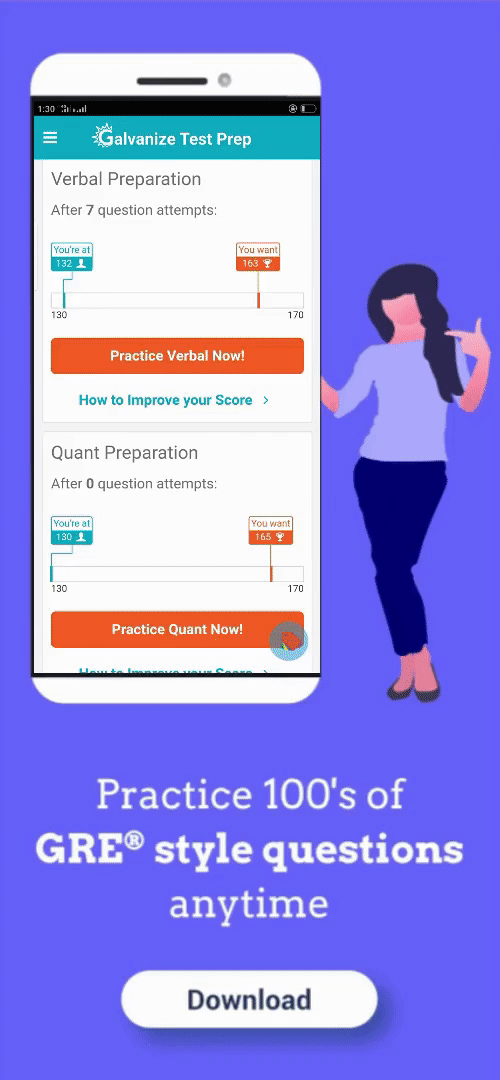

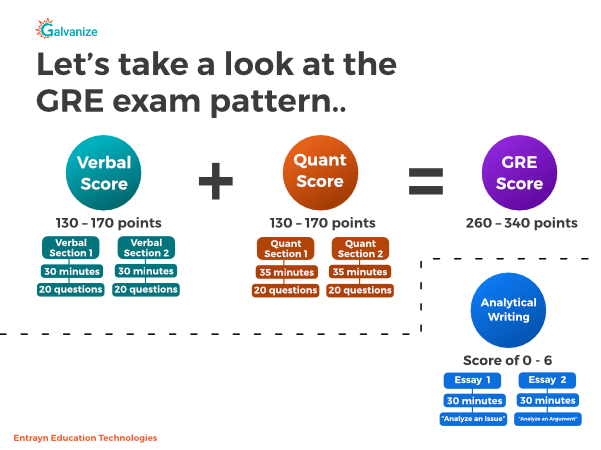
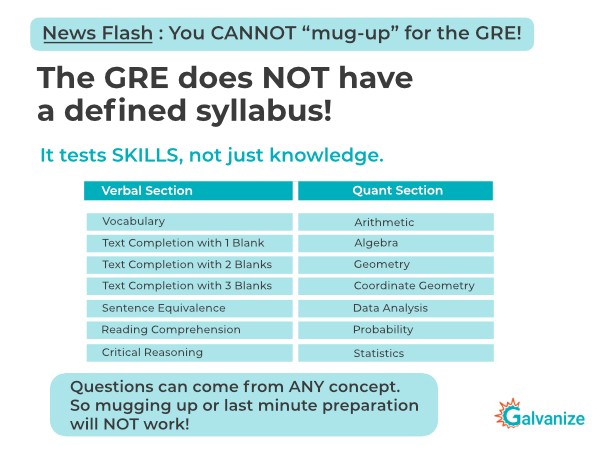

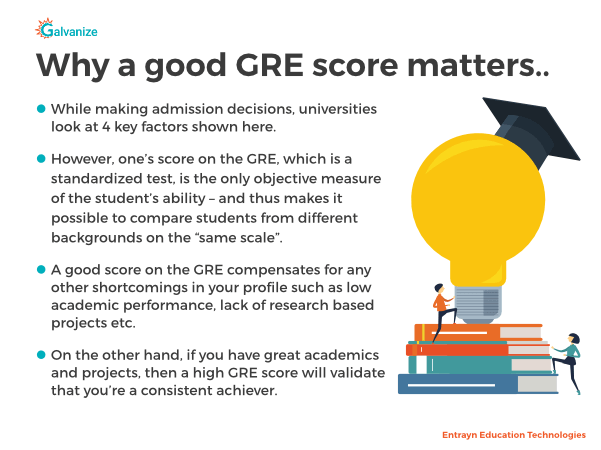
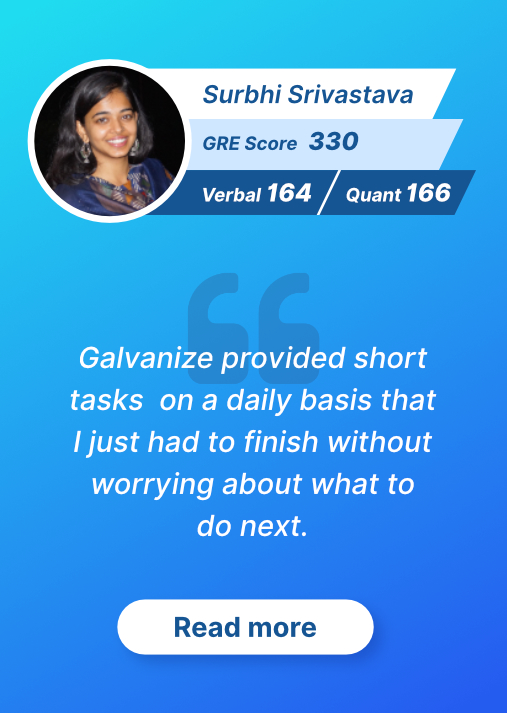
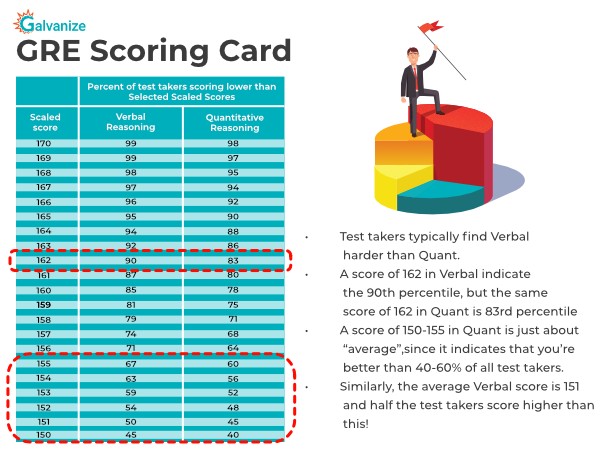
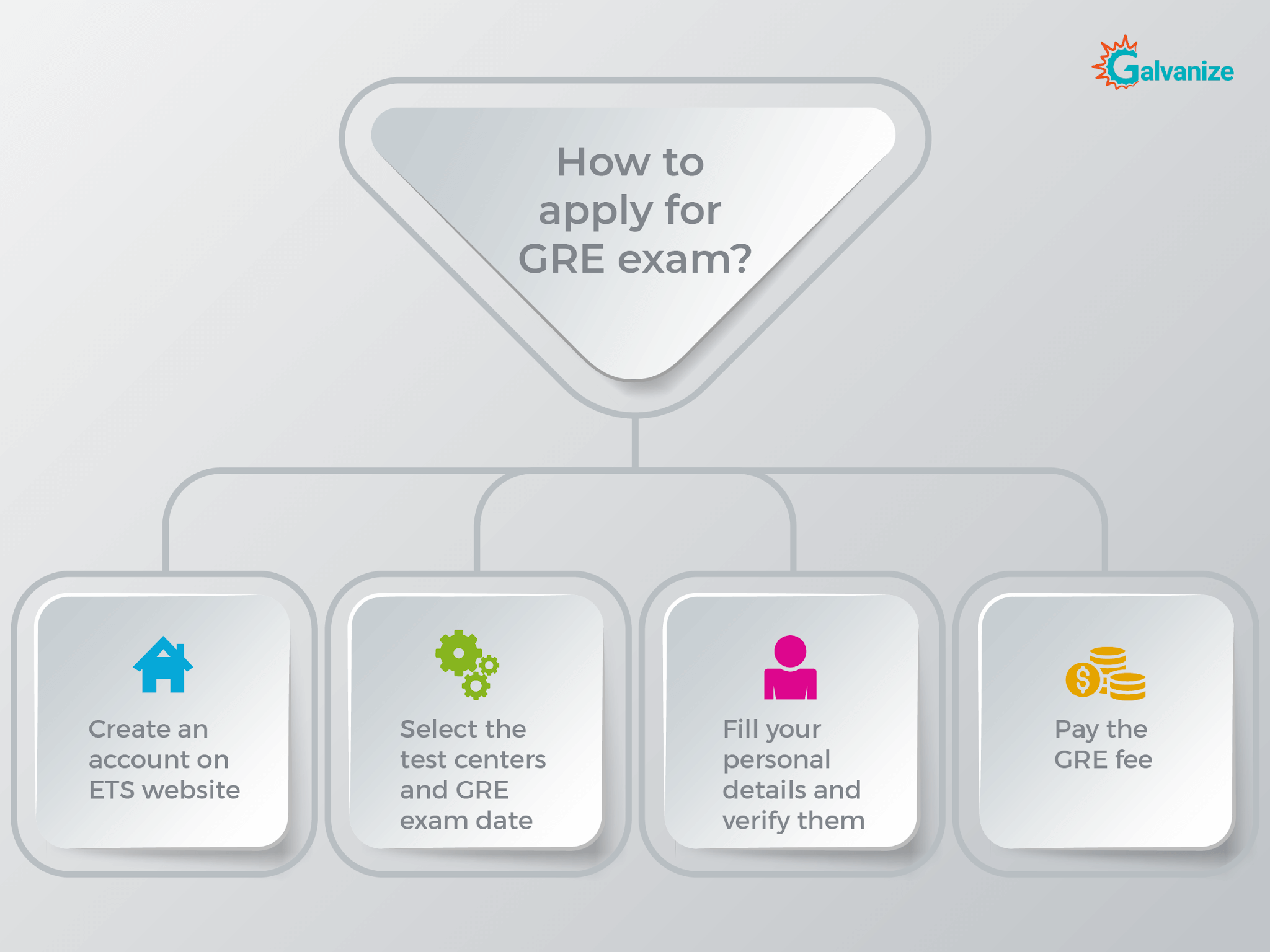








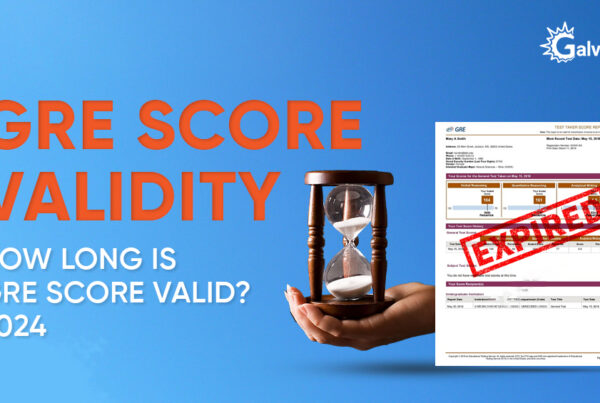


cool
Woah this is really cool
Really cool
that’s cool.
A really cool way of elucidating GRE information to an individual!!!
Awesome!!
Really very helpful. Got to know all the information regarding GRE.
Helpful.
Seems to Be an amazing blog for all the GRE aspirants
I have learnt a new thing about GRE
Really educating.
Thanks and God bless
Welcome, Felicia! We are glad you enjoyed it. Happy reading.
Thank you for such detailed information. I have also recently found a list of important links with information about GRE: http://webserver.tnstate.edu/nsf-urm/links.aspx, https://cutt.ly/Zkr53cB I think it will also be useful for those who are preparing.
There’s a lot of valuable information in here. Thanks.
Great Explanation. Really Helpful!!
Some of the tips for preparing GRE exam
1.Start early and Prepare for an extended period
2.Take practice tests
3.Develop a suitable Test-taking strategy
4.Take the test multiple times
5.Choosing a dedicated study area
6.Stick to your study plan
7.Study on the go if required
8.Avoiding distractions
9.Self-care
Some of the tips for preparing GRE exam
1.Start early and Prepare for an extended period
2.Take practice tests
3.Develop a suitable Test-taking strategy
4.Take the test multiple times
5.Choosing a dedicated study area
6.Stick to your study plan
7.Study on the go if required
8.Avoiding distractions
9.Self-care
great post